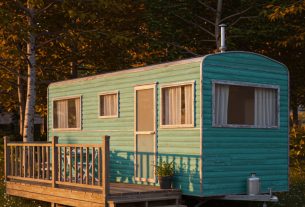As a resident of a mobile home park, the thought of the park being sold can be unsettling. You may wonder how this change will impact your living situation, your rights as a tenant, and what steps you should take moving forward. I’ve been in that position before, and understanding the implications of a sale is crucial for anyone living in a mobile home community. In this article, I’ll share my insights on what happens if your mobile home park is sold, outline your rights, and provide actionable steps to navigate this transition.
Understanding Mobile Home Park Sales
First, let’s clarify what it means when a mobile home park is sold. Generally, the property is purchased by a new owner, which may lead to various changes in management, rules, and even the future of the park itself. In many cases, the new owner may have different intentions for the property—whether that means upgrading the park, raising rents, or even turning it into something entirely different. It’s essential to be informed about these possibilities.
My Rights as a Mobile Home Park Resident
When a mobile home park is sold, your rights as a resident can vary significantly based on local and state laws. Here’s a breakdown of some critical rights you should be aware of:
- Lease Agreements: Most mobile home parks operate under lease agreements, which provide certain protections. Make sure to review your lease to understand your rights regarding rent increases, eviction processes, and park rules.
- Notice Period: In many states, landlords must provide a notice period before any changes take effect. This notice can range from 30 to 90 days, depending on local laws.
- Rent Control Laws: Some jurisdictions have rent control laws that limit how much a new owner can increase rent. Familiarize yourself with these laws to protect yourself from steep rent hikes.
- Right to Organize: As a resident, you have the right to organize with other tenants to address concerns collectively and negotiate with new management.
What Changes Can I Expect?
When a mobile home park is sold, several changes may occur. Here are a few potential scenarios:
- Increased Rent: New owners may choose to raise rents to align with market rates. It’s essential to evaluate how this affects your budget.
- Changes in Park Rules: The new management may implement different rules or policies that could impact your lifestyle.
- Improvements and Upgrades: Conversely, the new owner may invest in the park to improve facilities and overall living conditions, which can enhance your quality of life.
- Potential Closure: In extreme cases, a new owner may decide to close the park, forcing residents to relocate.
How to Prepare for a Potential Sale
While I can’t control whether my mobile home park is sold, I can take proactive steps to prepare for the possible outcomes. Here’s what I recommend:
- Review Your Lease: Understanding the terms of your lease is critical. Pay close attention to clauses related to rent increases and termination.
- Stay Informed: Keep an ear to the ground about any rumors regarding the sale of the park. Connect with other residents to share information.
- Know Your Rights: Familiarize yourself with local and state laws governing mobile home parks. Resources such as the National Manufactured Home Owners Association (NMHOA) can be invaluable.
- Plan Financially: Prepare for potential rent increases by reviewing your budget and savings. This foresight can mitigate financial stress down the line.
What Should I Do if My Park is Sold?
If you discover that your mobile home park has been sold, it’s essential to take specific actions to protect yourself and your interests. Here’s a step-by-step guide:
Step 1: Communicate with New Management
Once the sale is finalized, reach out to the new management. Establishing a line of communication is crucial for understanding any immediate changes and expressing your concerns. Make sure to ask:
- What are the plans for the park?
- Will there be changes to rent or policies?
- How will maintenance requests be handled?
Step 2: Gather Your Neighbors
Creating a united front can be powerful. Connect with your neighbors to discuss the situation and develop a collective approach to addressing any concerns. Together, you can:
- Form a tenants’ association.
- Share information about your rights.
- Organize meetings with management.
Step 3: Document Everything
Keep a record of all communications with the new management. Document any changes in policies, rent, or maintenance issues. This documentation can serve as vital evidence if disputes arise.
Step 4: Know Your Legal Options
If you believe that the new management is violating your rights, consider seeking legal advice. Many communities offer legal assistance for mobile home residents. A few key points to keep in mind include:
- Local tenant protection laws.
- Resources available through local housing authorities.
- Legal aid organizations that specialize in housing issues.
Case Studies: Real-Life Experiences
To illustrate the potential outcomes of mobile home park sales, let me share a couple of real-life examples:
Case Study 1: The Successful Transition
In a quaint mobile home park in California, the residents were informed of a pending sale. They quickly organized a tenants’ association, which allowed them to communicate effectively with the new management. The new owner was receptive to their concerns and committed to gradual improvements, such as better landscaping and upgraded facilities. As a result, the residents enjoyed enhanced living conditions and maintained reasonable rent increases.
Case Study 2: The Difficult Closure
Contrastingly, in another case in Florida, a mobile home park was sold to a developer with plans for commercial development. The residents received a 60-day notice to vacate the premises. Many faced challenges relocating their homes, as the new owner was unwilling to negotiate. This situation highlights the importance of being prepared for all potential outcomes.
Statistics and Trends in Mobile Home Park Sales
The mobile home park landscape is evolving, and understanding the trends can provide insight into what to expect. Here are some key statistics:
- According to the Manufactured Housing Institute, there are approximately 22 million people living in manufactured housing in the U.S.
- Over the past decade, the number of mobile home parks has decreased by about 10%, as many are sold for redevelopment.
- Rent increases in mobile home parks have averaged between 3-5% annually, depending on the region.
These statistics highlight the importance of being aware of the market dynamics and how they can affect mobile home park residents.
Conclusion
In conclusion, the sale of a mobile home park can bring about significant changes that impact your living situation. It’s vital to understand your rights, prepare for potential outcomes, and take proactive steps to navigate this transition. By staying informed, organizing with neighbors, and knowing your legal options, you can protect your interests and adapt to the new management.
As you reflect on your rights and next steps, remember that you are not alone. Many residents face similar challenges, and collective action can lead to positive outcomes. If you found this article helpful, I encourage you to share it with friends and on social media. Additionally, sign up for our newsletter for ongoing insights and support tailored to mobile home park residents.
Frequently Asked Questions (FAQ)
What should I do if my rent increases significantly after a sale?
First, review your lease agreement and local laws regarding rent control. If the increase seems unjustified, consider discussing it with the management or seeking legal advice.
Can the new owner evict me without notice?
No, most jurisdictions require a notice period before eviction. Familiarize yourself with local eviction laws to protect your rights.
How can I stay informed about potential sales in my park?
Stay connected with your neighbors and attend community meetings. Being proactive in communication can help you gather information early.
Thank you for reading! I hope this article empowers you to navigate the complexities of mobile home park sales with confidence.
Camco TST MAX RV Toilet Treatment Drop-INs - Control Unwanted Odors & Break Down Waste and Tissue - Safe Septic Tank Treatment - Orange Scent, 30-Pack (41183)
$12.83 (as of November 13, 2025 07:53 GMT -03:00 - More infoProduct prices and availability are accurate as of the date/time indicated and are subject to change. Any price and availability information displayed on [relevant Amazon Site(s), as applicable] at the time of purchase will apply to the purchase of this product.)
Sign up for our newsletter and stay up to date with exclusive news
that can transform your routine!





